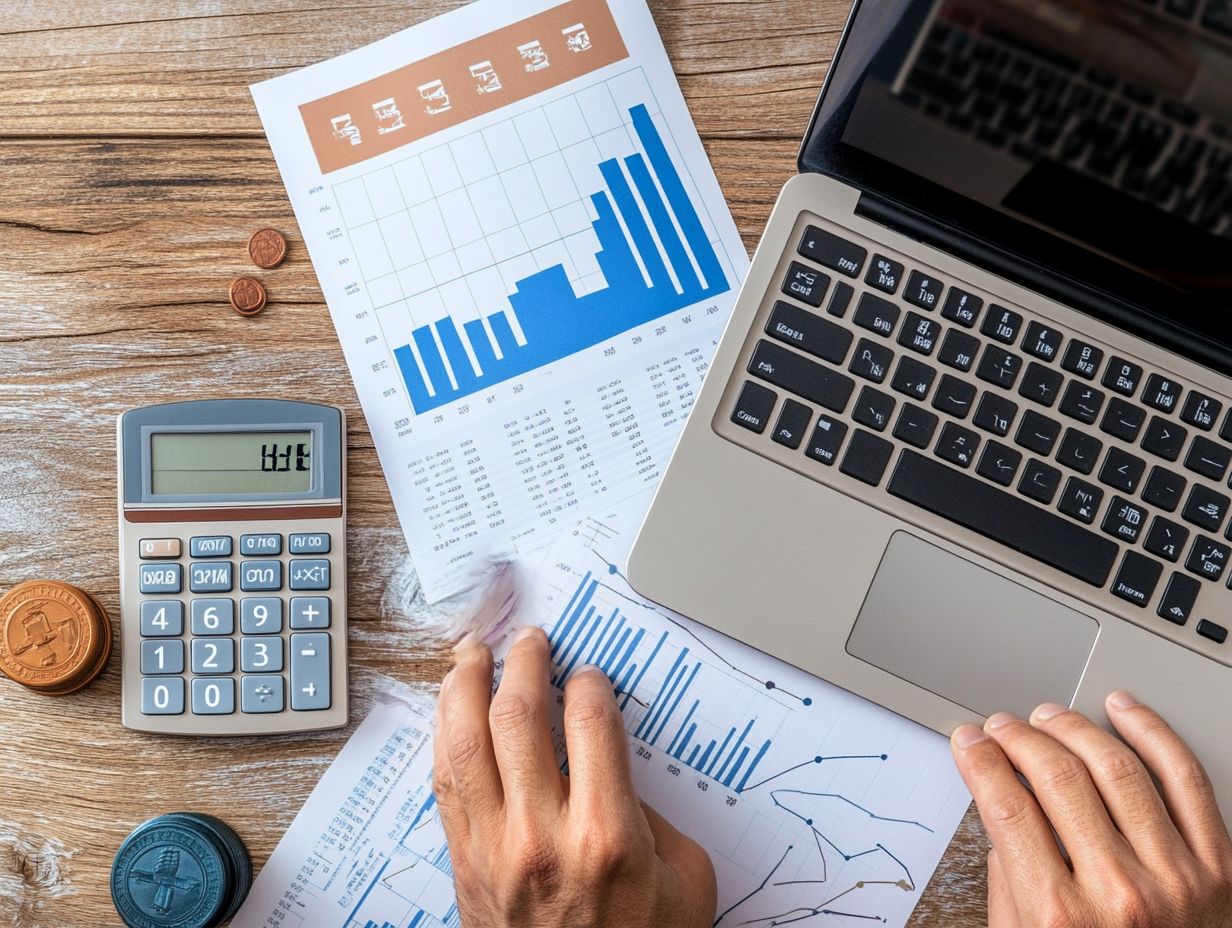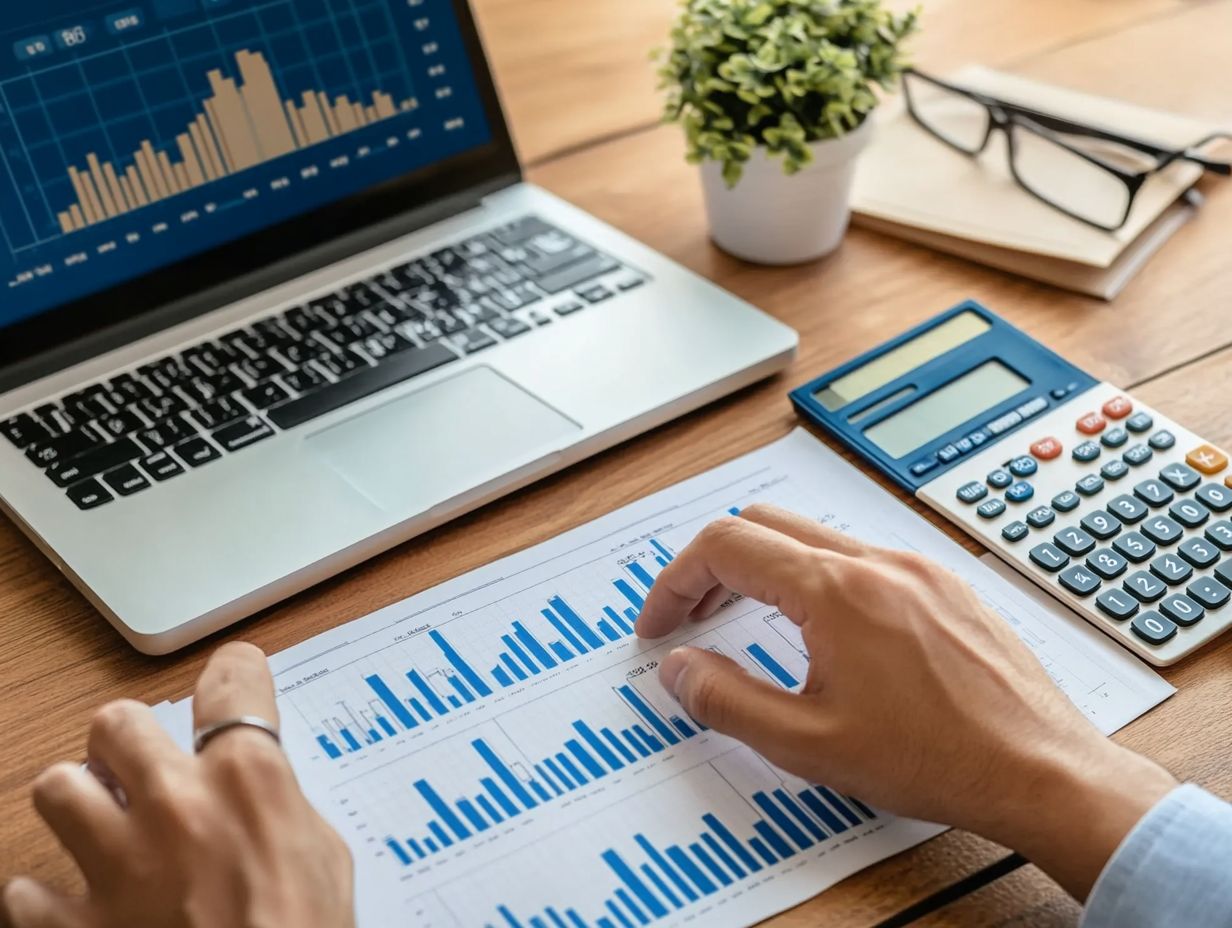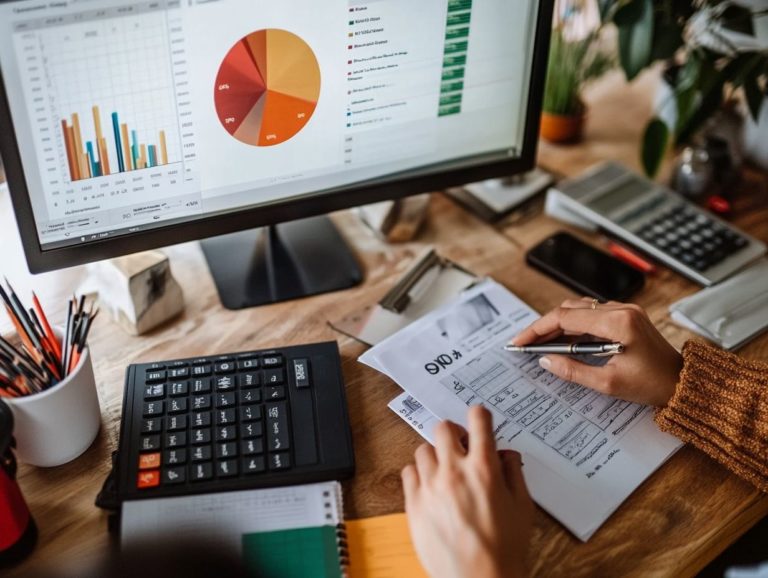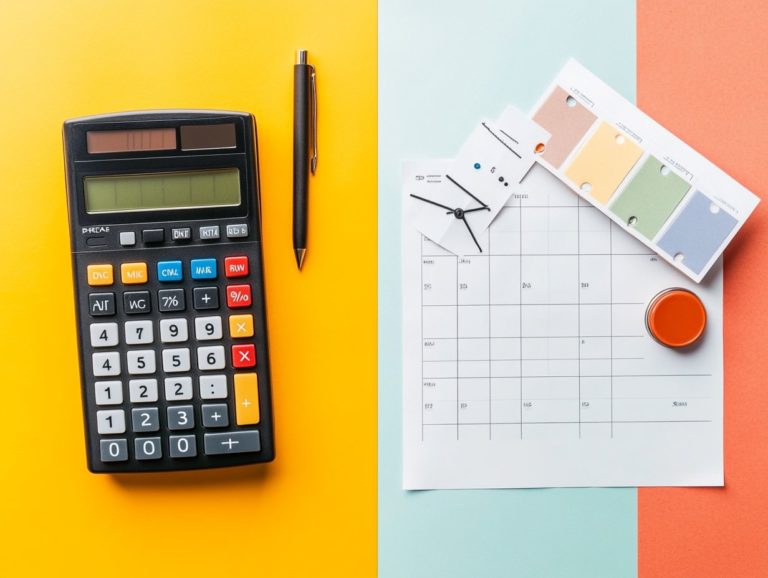What Is the Impact of Inflation on Budgeting?
Inflation is a complex economic issue that impacts every corner of your financial life, especially your budgeting strategies.
Grasping its definition and causes is essential for navigating the challenges it brings. As prices rise and purchasing power diminishes, budgeting becomes daunting, leading many to pursue effective adaptation strategies.
This article explores the immediate effects of inflation on your finances, offers practical budgeting tips, and investigates the long-term implications for debt management and retirement planning.
Get ready to tackle inflation head-on with the tips you’ll find here!
Contents
- Key Takeaways:
- Understanding Inflation
- Effects of Inflation on Budgeting
- Strategies for Budgeting During Inflation
- Long-Term Impact of Inflation on Budgeting
- Managing Debt During Inflation
- Frequently Asked Questions
- What is the impact of inflation on budgeting?
- How does inflation affect budgeting decisions?
- What are some ways to mitigate the impact of inflation on budgeting?
- Can inflation have a positive impact on budgeting?
- How does inflation impact savings and retirement planning?
- Does inflation affect all types of expenses equally?
Key Takeaways:

- Inflation reduces the purchasing power of money, making budgeting more challenging. It’s vital to consider inflation when planning your budget.
- During inflation, adjust your budget and look for ways to save. These strategies can help lessen the financial impact.
- Inflation affects long-term budgeting, including retirement and debt management. Plan wisely to maintain your financial stability.
Understanding Inflation
Understanding inflation is crucial as you navigate today s economy. It has profound implications for the U.S. federal government’s fiscal challenges, influencing everything from annual deficits to the federal budget.
Inflation is measured by the Consumer Price Index (CPI), a tool that tracks how prices for goods and services change over time. As inflation rises, it erodes your purchasing power and affects economic policies that directly impact lower-income households.
The Federal Reserve manages interest rates, shaping inflation dynamics and determining the nation’s economic future.
Definition and Causes
Inflation is the rate at which the general level of prices for consumer goods and services rises, diminishing your purchasing power.
To understand inflation, we must look into the various factors contributing to this issue. One key factor is demand-pull inflation, which occurs when consumer demand for goods and services exceeds supply, prompting businesses to raise prices. Conversely, cost-push inflation emerges when production costs rise think higher wages or increased raw material prices forcing producers to pass those costs onto you, the consumer.
Federal spending programs can also significantly shape inflationary trends. When the government injects capital into the economy without matching revenue increases, it can stimulate demand, intensifying inflationary pressures. Economic analyses often emphasize the delicate balance between these forces, highlighting how policy decisions impact overall economic stability.
Effects of Inflation on Budgeting
Inflation profoundly impacts your budgeting processes. As prices rise, you may grapple with increased annual deficits. This shift often necessitates reallocating the federal budget’s focus, moving away from discretionary spending to prioritize essential purchases.
Consequently, various spending categories are affected, compelling you to navigate this complex financial landscape with care and strategy.
Increased Costs and Reduced Purchasing Power
As inflation rises, you may notice a decline in your purchasing power, leading to financial strain, especially if you’re in a lower-income bracket.
This decline is evident in the prices of essential goods, which have soared. For example, recent reports indicate that food prices have jumped nearly 10% over the past year, compelling many families to rethink their shopping habits. Energy costs have surged as well, with household energy bills climbing around 15%, further tightening the financial squeeze.
If you re looking to buy a home, you re likely feeling the pinch; rising mortgage rates make it increasingly challenging to qualify for loans.
In this evolving economic landscape, closely examining your spending patterns is crucial as you and your family adapt to these new realities.
Strategies for Budgeting During Inflation

Developing effective strategies for budgeting during inflation is essential for you to mitigate the financial impacts of rising prices.
By implementing thoughtful planning and resource allocation, you can navigate these economic challenges with confidence.
Adjusting for Inflation in Budget Planning
Updating your budget to account for rising prices is crucial for maintaining financial stability. This enables you to anticipate and manage potential increases in expenses.
By acknowledging how rising costs can affect your everyday expenditures, you can proactively adjust your budget to accommodate these shifts.
This process involves calculating inflation-adjusted values, allowing you to set more realistic spending limits. Act now! Set aside part of your budget for high-interest savings accounts to stay ahead of inflation.
Many individuals may falter by underestimating price increases or neglecting to adjust their savings targets. This can lead to a lack of financial preparedness.
Being aware of these common pitfalls can significantly enhance your strategic planning. You ll be better equipped for the future.
Ways to Save Money
Discovering smart ways to save money during inflation is essential as you face rising costs.
One effective approach is to create a well-structured budget that minimizes reliance on credit cards. Emphasizing the importance of setting aside a portion of your income into high-yield savings accounts is key.
Incorporating specific budgeting tips, like tracking your discretionary spending and prioritizing essential purchases, can significantly lessen the impact of inflation.
By consciously limiting non-essential expenses and regularly reviewing your spending habits, you can allocate funds for savings. This ensures you have a financial cushion against rising prices.
Long-Term Impact of Inflation on Budgeting
Inflation can significantly impact your financial planning and budgeting strategies, influencing key decisions regarding retirement savings and expense management.
Being aware of these implications allows you to navigate your financial future with greater confidence.
Planning for Retirement and Future Expenses
Effective retirement planning involves a keen awareness of inflation’s impact. Rising prices can gradually erode your savings and compromise your long-term financial security.
To ensure you have sufficient financial resources during retirement, it’s essential to regularly reassess and adjust your savings goals.
This proactive stance includes increasing contributions to retirement accounts and considering inflation-protected investment strategies, like Treasury Inflation-Protected Securities (TIPS).
Understanding the implications of inflation extends beyond your personal finances. It s vital for grasping how it affects federal debt and your overall spending power.
By staying attuned to these broader economic factors, you can craft a more resilient retirement plan one that withstands inflationary pressures and adapts to the ever-evolving economic landscape.
Managing Debt During Inflation

Managing debt in an inflationary environment brings its own set of challenges, especially as interest rates climb.
The costs associated with borrowing rise across different types of consumer loans.
Dealing with Higher Interest Rates
Dealing with higher interest rates during inflation demands a proactive approach to budgeting and strategic financial planning to prevent undue financial strain.
As rates rise, reassess your financial strategies to protect your budget effectively. Consider options like changing your loan terms to lower payments, especially for home mortgages or student loans.
Consolidating multiple loans into one to make payments easier not only simplifies your monthly obligations but can also reduce your overall payments. Identify areas to cut costs and save money, like those streaming subscriptions or frequent dining out, to free up crucial cash flow for better debt management.
Ultimately, embracing a more flexible financial approach will enhance your resilience in these unpredictable economic times.
Alternative Options for Debt Management
Exploring alternative options for effective debt management is essential, especially when traditional strategies fall short in the face of inflation and economic uncertainties.
These alternatives might involve adopting innovative ways to save money that fit your unique financial situation. Not only can these approaches help alleviate immediate debt pressures, but they also contribute to your long-term fiscal health.
Gaining a solid understanding of the federal budget’s role can offer valuable insights into the resources and programs available that can aid in your debt reduction efforts.
By conducting a thorough economic analysis, you can make informed decisions as you evaluate your current financial landscape. This enables you to prioritize expenses, consolidate debts wisely, and ultimately pave the way for a more sustainable financial future.
Frequently Asked Questions
-
What is the impact of inflation on budgeting?
Inflation refers to the general increase in prices of goods and services over time. This can have a significant impact on budgeting as it affects the purchasing power of money and can lead to changes in the cost of living.
-
How does inflation affect budgeting decisions?
Inflation can make it difficult to accurately predict and allocate funds for expenses, as the prices of goods and services may rise unexpectedly. This can lead to budget shortfalls and the need to make adjustments or cut back on certain expenses.
-
What are some ways to mitigate the impact of inflation on budgeting?
The most effective way to mitigate the impact of inflation on budgeting is to regularly review and adjust your budget to account for price increases. It may also be beneficial to diversify your investments and consider options with a higher potential for returns to offset the effects of inflation.
-
Can inflation have a positive impact on budgeting?
In some cases, inflation can have a positive impact on budgeting. For example, if you have a fixed-rate debt, such as a mortgage, inflation can decrease the real value of your debt over time. This means that you will be paying off your debt with money that is worth less in the future.
-
How does inflation impact savings and retirement planning?
Inflation can erode the purchasing power of your savings and retirement funds if they are not keeping pace with the rate of inflation. This means that you may need to save more or invest in assets with a higher potential for growth to maintain your desired standard of living in the future.
-
Does inflation affect all types of expenses equally?
No, the impact of inflation can vary depending on the type of expense. For example, essential expenses such as housing and food may be more affected by inflation than discretionary expenses like entertainment or travel. It’s important to consider the different rates of inflation for each expense category when creating a budget.
Act now to reassess your financial strategies and consult a financial advisor for personalized advice!







